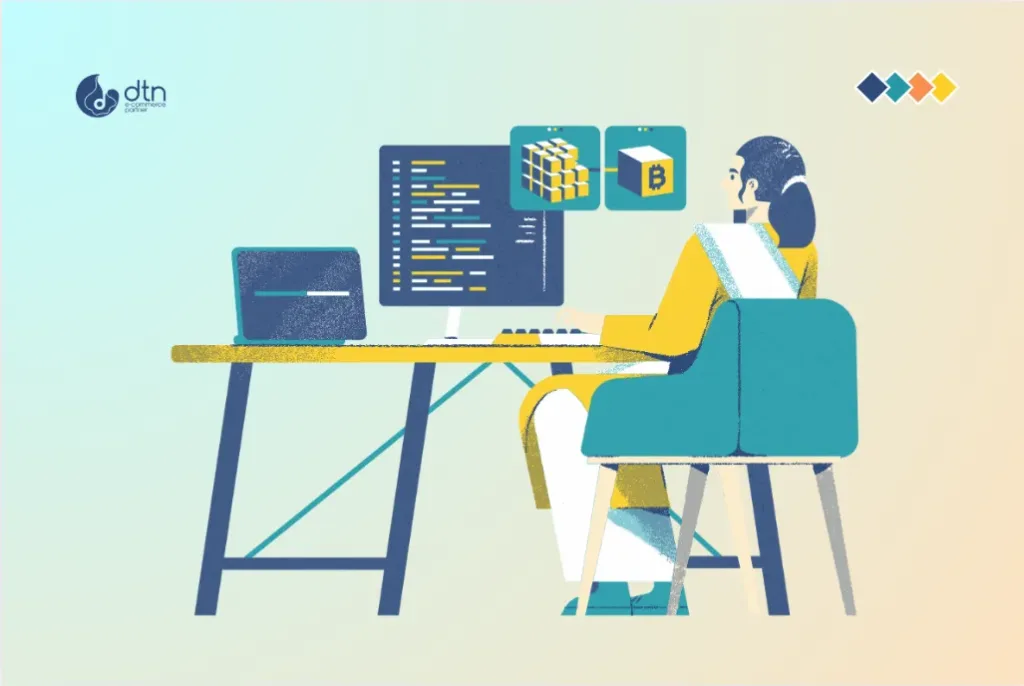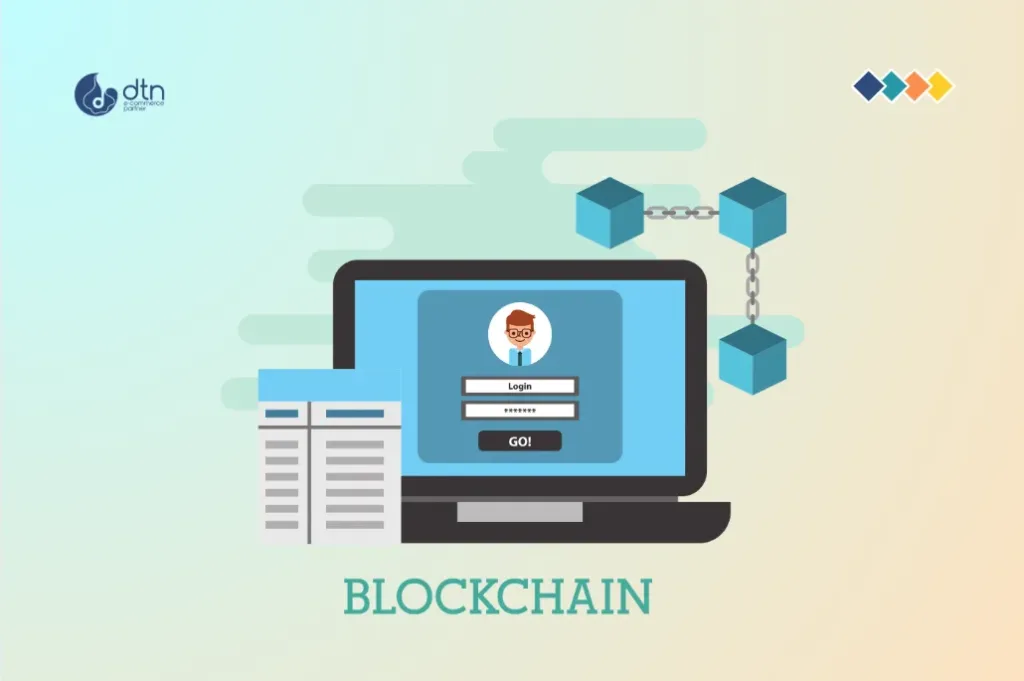The buzz around blockchain technology has been undeniable. It promises to disrupt industries and reshape our digital world. While the initial focus was on cryptocurrencies, the potential of blockchain extends far beyond financial applications. One of the most exciting frontiers is e-commerce, where blockchain is critical to streamlining operations, enhancing security, and building trust between businesses and consumers.
Table of Contents
Beyond the Hype: Understanding Blockchain’s Fundamentals
Before diving into e-commerce applications, let’s briefly unpack the core concepts of blockchain:
- Decentralized and Transparent: Unlike traditional systems relying on centralized authorities, blockchain operates on a decentralized network. Information is distributed across multiple computers, making it virtually impossible to tamper with or manipulate. This transparency fosters trust and accountability.
- Immutable Records: Once data is added to a blockchain, it’s immutably recorded on the network. Records are permanent and verifiable, eliminating the risk of fraudulent alterations.
- Smart Contracts: These self-executing programs automate specific tasks and agreements, eliminating the need for intermediaries and streamlining processes.

Blockchain’s Impact on E-commerce: A Revolution in Progress
Blockchain’s decentralized, secure, and transparent nature makes it ideal for addressing the e-commerce industry’s various challenges.
1. Enhancing Security and Trust
- Secure Payment Processing: Blockchain eliminates the reliance on traditional intermediaries, such as banks, for payment processing. This reduces the risk of fraud and data breaches, leading to safer and more efficient transactions.
- Protection Against Counterfeiting: Blockchain can track the provenance of products throughout the supply chain, enabling consumers to verify authenticity and prevent the sale of counterfeit goods.
- Enhanced Data Security: Blockchain offers a robust solution for protecting customer data, preventing unauthorized access, and ensuring privacy.
2. Streamlining Supply Chain Management
- Real-time Tracking: Blockchain enables real-time tracking of goods from origin to delivery, providing greater visibility and transparency throughout the supply chain.
- Automated Inventory Management: Smart contracts can automate inventory management processes, simplifying stock control and reducing operational costs.
- Improved Traceability: Blockchain fosters transparency by tracking products’ journeys, helping businesses identify and resolve issues faster.
3. Empowering Customer Loyalty Programs
- Reward System Transparency: Blockchain-based reward systems offer transparency and immutability, ensuring fair and accurate record-keeping of customer loyalty points.
- Data Ownership and Control: Blockchain allows customers to have greater control over their data, allowing them to choose how it’s used and shared.
- Personalized Experiences: Blockchain enables businesses to tailor customized rewards and offers based on customer data, fostering more robust customer relationships.
4. Enabling New Business Models
- Decentralized marketplaces: Blockchain facilitates the creation of decentralized marketplaces where buyers and sellers can connect directly, eliminating the need for intermediaries.
- Tokenized assets: Blockchain allows tokenizing various assets, such as digital art, music, or physical goods, enabling fractional ownership and easier trading.
- Micro-payments and subscriptions: Blockchain simplifies micro-payments and recurring subscriptions, creating new revenue streams and business opportunities.

Examples of Blockchain in Action
Several e-commerce businesses are already harnessing the power of blockchain:
- Walmart: Walmart uses blockchain to track the origin of its food products, ensuring safety and transparency throughout the supply chain.
- Amazon: Amazon is exploring blockchain solutions to enhance its logistics operations and improve the efficiency of its delivery network.
- eBay: eBay is leveraging blockchain to protect buyers from fraudulent transactions and ensure the authenticity of high-value items.

Challenges & The Future of Blockchain in E-commerce
While the benefits are clear, several challenges and considerations need to be addressed for blockchain adoption to be successful:
- Scalability: Blockchain networks need to handle significant transactions without compromising performance.
- Regulation and Compliance: Governments and regulatory bodies are still developing frameworks for blockchain technologies.
- User adoption: Mass adoption requires user-friendly interfaces and solutions that simplify complex blockchain concepts.
While blockchain technology is still in its early stages of development, its potential for e-commerce is undeniable. The industry is poised for a significant shift, with blockchain driving increased efficiency, transparency, and security. As businesses adopt blockchain solutions, we expect to see a wave of innovative applications that redefine the e-commerce landscape.

Conclusion
Blockchain technology is poised to revolutionize the e-commerce industry, offering solutions to its most pressing challenges. By embracing blockchain’s decentralized, secure, and transparent nature, businesses can streamline operations, enhance customer experiences, and unlock new growth opportunities. While challenges exist, the potential of blockchain for e-commerce is undeniable, and the future holds immense possibilities for this transformative technology.
Frequently Asked Questions
We’ve compiled a list of answers to common questions.
How is blockchain technology impacting e-commerce beyond cryptocurrencies?
Blockchain’s decentralized and transparent nature streamlines operations enhances security, and builds trust between businesses and consumers. It offers solutions for secure payment processing, counterfeiting protection, and improved data security.
What core concepts of blockchain are relevant to e-commerce?
Blockchain operates on a decentralized network, ensuring transparency and accountability. It records immutable data, prevents fraudulent alterations, and uses smart contracts to automate tasks and agreements, eliminating the need for intermediaries.
How does blockchain enhance security and trust in e-commerce?
Blockchain enhances security by eliminating reliance on intermediaries for payment processing, reducing fraud risks, and protecting customer data. It also tracks product provenance, preventing the sale of counterfeit goods.
What are the benefits of blockchain for supply chain management in e-commerce?
Blockchain provides real-time tracking of goods, automates inventory management with smart contracts, and improves traceability, offering greater visibility and efficiency throughout the supply chain.
What new business models does blockchain enable in e-commerce?
Blockchain facilitates decentralized marketplaces and tokenized assets and simplifies micro-payments and subscriptions. By eliminating intermediaries and enabling fractional ownership, these innovations create new revenue streams and business opportunities.



